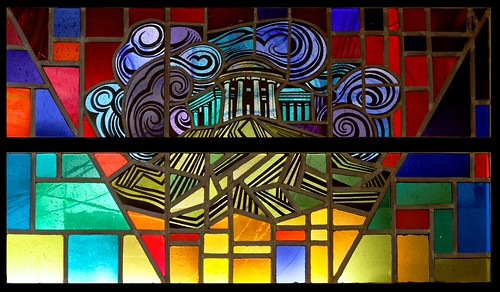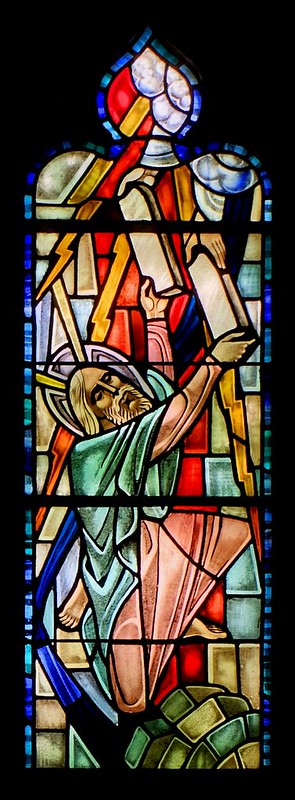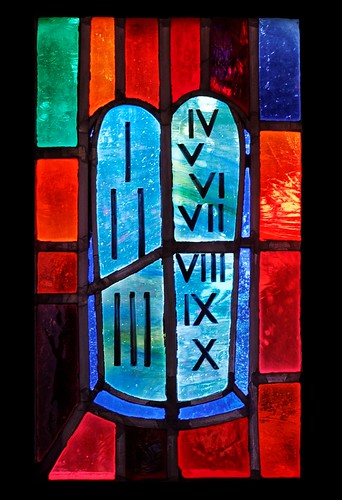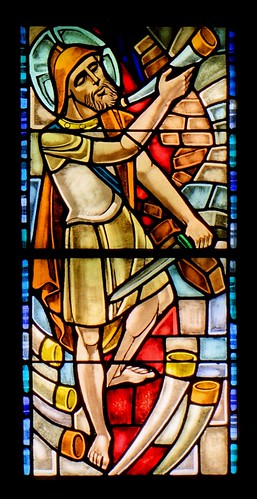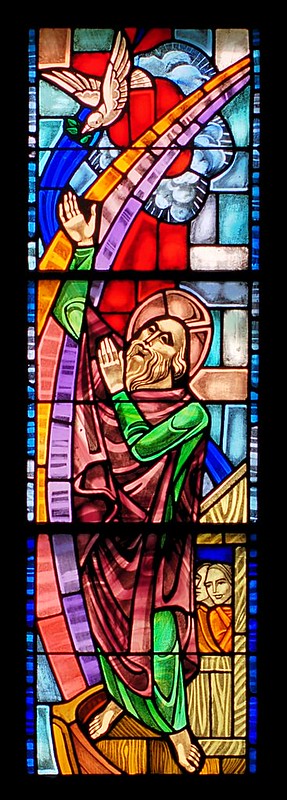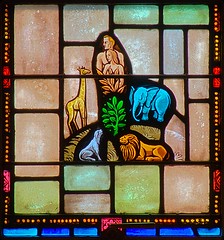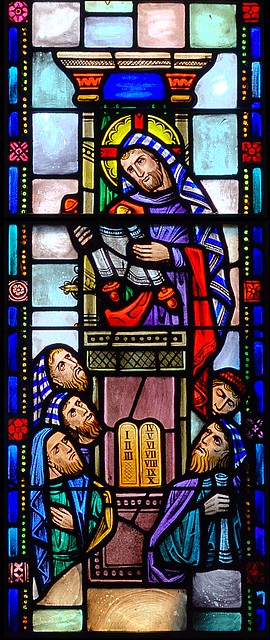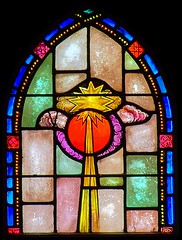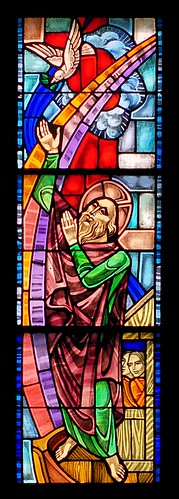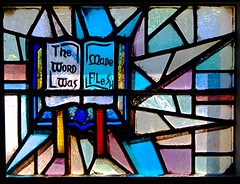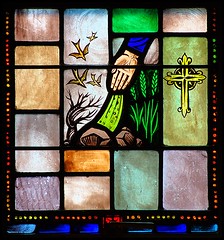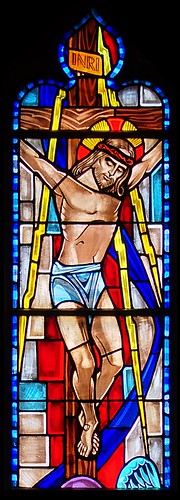(Part 3 of a series of 9 articles on the Beatitudes)
by Pastor Paul Wolff
 |
| Blessed are the meek for they shall inherit the earth. Matthew 5:5 Photo from a mosaic in the Saint Louis Cathedral, St. Louis Missouri |
The world says, “might makes right” and “power rules” and other such things. The world despises the meek as weak and powerless people who are to be taken advantage of, and enslaved (if possible). Marxism, especially, is all about the exercise of power, and though we all hoped that Marxism was on its way to oblivion – where it belongs – after the fall of the Berlin Wall in 1987 and the subsequent collapse of the Soviet Union, but it seems to be gaining in popularity by ignorant people who don’t mind becoming tyrants who are cursed by all good, peace-loving people whom they oppress.
Marxism would be a very funny joke if people didn’t take it seriously and murder people on an industrial scale. The idea is that there are two types of people: oppressors and oppressed. You could picture two people where one imagines that he has been wronged (oppressed) by the other in some small way and slaps the other. Now the tables are turned, and the other person is oppressed and he slaps back. Since these are both committed Marxists this continues until one gets tired of being slapped and hits back harder. This necessarily escalates until one murders the other. This is the necessary result of Marxist ideology and it cannot be any other way, unless one or both gives up on this demonic way of thinking.
Meek people are not necessarily oppressed, and need not view themselves as such (even when they are). Meekness is about how individuals act toward others in love. Jesus said later in the Sermon on the Mount that Christians ought to “turn the other cheek” (Matthew 5:39) when someone strikes them in the face, rather than escalating the fight to murderous levels. This is how Christians are meek in love – not asserting their “rights” but forgiving their neighbor in love, and enduring all kinds of indignities for the sake of Christ. This is not cowardice at all (though the world may mistake it for cowardice), but meekness comes from the brave trust in the forgiveness and justice of God, and showing their neighbors the love of Christ in their lives.
Though Christian meekness is a virtue, we should understand that we cannot win salvation by being meek. There is nothing that anyone can do to save themselves. James (2:10) says, “For whoever keeps the whole law and yet stumbles at just one point is guilty of breaking all of it.” We are all conceived and born in sin, and have inherited the corruption and guilt of sin, so none of us can save ourselves. Yet since Christ Jesus has redeemed us and gives us salvation and eternal life as a gift, then we don’t need to “assert our rights” and “take justice into our own hands” but we can leave vengeance to the righteous judgment of God. Scripture says, “Do not take revenge, my friends, but leave room for God’s wrath, for it is written: ‘It is mine to avenge; I will repay,’ says the Lord.” (Romans 12:19 – from Proverbs 20:22 and Deuteronomy 32:35)
 |
| The inheritance of the meek is not this corrupted, sinful world, but the new earth God prepares for His people. (See Revelation 21) |
 |
| Jesus was meek to fulfill God's plan of salvation to redeem us from our sins. |
Though Jesus is the creator (with the Father and the Holy Spirit) of all that exists, He did not come in power and glory, but was born quietly in Bethlehem. Because the census required people to register at their ancestral home, Bethlehem was crowded and no one made room for the birth of the Son of God, He spent His first night after His birth sleeping in a manger. Though after the local shepherds heard what the angels said about Him, surely more comfortable accommodations were found for the holy family after that. When the magi from the East came to worship the King of Judah, they went to Jerusalem first because they expected the newborn king to be in the royal palace in the capital city, yet the Holy Family was still in Bethlehem. This is one way which shows the meekness of Jesus. This was according to God’s plan. God became incarnate in Jesus in order to serve us sinners, not to rule in power. God has all power, but He came meekly to provide forgiveness and salvation for us all.
 |
| “He was oppressed, and he was afflicted, yet he opened not his mouth; like a lamb that is led to the slaughter, and like a sheep that before its shearers is silent, so he opened not his mouth.” (Isaiah 53:7) |
The ultimate expression of the meekness of Jesus was His passion. When His work was done, He allowed His enemies to arrest Him, put Him on trial prejudicially, and crucify Him. Jesus was meek as he was led to his crucifixion. This fulfilled the prophesy from Isaiah, “He was oppressed, and he was afflicted, yet he opened not his mouth; like a lamb that is led to the slaughter, and like a sheep that before its shearers is silent, so he opened not his mouth.” (Isaiah 53:7) Sheep don’t mind going to the shearers, but Jesus knew He was not just going to get a haircut, but would suffer and die a horrible death. Even his judge, Pontius Pilate, was surprised that Jesus didn’t defend himself from outrageous, unsubstantiated accusations. He was mocked, beaten, and nailed to a cross. No false god in the world would be caught dead on a cross, but the true God was there to pay the price for the sins of the world. The result of Christ’s sacrifice is the full forgiveness of sins, and salvation for all who put their trust in Him. Because Jesus faithfully fulfilled God’s plan for salvation the result for Him is described by Saint Paul in this way: “Therefore God exalted him to the highest place and gave him the name that is above every name, that at the name of Jesus every knee should bow, in heaven and on earth and under the earth, and every tongue confess that Jesus Christ is Lord, to the glory of God the Father.” (Philippians 2:9-11) Now, that Jesus has paid for our sins and won our salvation, He is glorified, and uses His divine power fully always. Perhaps the only meekness He displays now is that He remains hidden, and He allows sin on the earth (with limits). When Jesus returns on the Last Day we will see Him in all His glory and power. Then He will judge the world and fulfill His promise to give His beloved children the inheritance of the new earth.
Other articles in this series:
Blessed are the Poor in Spirit
Blessed are Those who Mourn, For They Will be Comforted
Blessed are Those Who Hunger and Thirst for Righteousness, for They Shall be Satisfied
Blessed are the Merciful, for They Shall Receive Mercy
Blessed are the Pure in Heart, for They Shall See God
Coming soon:
Blessed are those who are persecuted for righteousness’ sake, for theirs is the kingdom of heaven.

